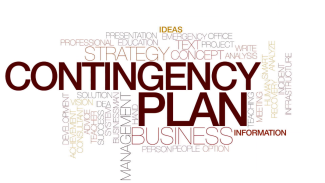
Contingency Plan
The importance of considering how the 5D’s (death, divorce, disability, departure, and disagreement) will challenge the future of your company and your family.
The psychology of planning for the future can be a tricky process and not one many of us like to face head-on given how busy our daily lives are. As an entrepreneur, planning for your exit and your retirement years is fundamental as this provides you with choices you would not have had otherwise.
An exit plan allows you as the entrepreneur to develop the leadership, management, and business development skills of the people who will run the business after you’ve left. It also allows you to focus on who will lead the business and maintain and grow the competitive advantage when you retire. A company without transition plans commonly overlooks a contingency plan, which is a road map for continued success.
Considering we are mortal and will not live forever, it is important to consider how the 5D’s (death, divorce, disability, departure, and disagreement) will challenge the future of your company and your family. As a Certified Financial Planner®with more than 13 years of experience, It has been my experience that a contingency plan will diminish factors such as downtime due to an unexpected exit, losing revenue, loss of valued employees and clients as well as misconceptions regarding responsibility.
What is an effective contingency plan?
Risk Management - What you should consider:
- Create a contingency planning team
- Create an emergency action plan
- Ensure you have life and disability insurance
- A Key personnel backup plan
- Safeguard against incomplete agreements
- Determine what happens to the company shares
Financial Matters:
- Review your profit and loss regularly
- Update a gross margin profit improvement plan
- Consider bonuses to retain employees
Personal Matters:
- Chat with your financial planner about your financial goals
- If you leave the company, what are your financial needs?
- What provisions are in place for your family in the event of your death?
Marketing:
- What is the strategy to attract new business if work is lost?
- Does the marketing strategy require an overhaul:
- Services
- Demographics
- Business development
- Marketing events
- Establish a system to track sales leads
Continuity Planning
Continuity planning is comprised of two separate phases, which are Succession Planning and Exit Planning.
Succession Planning – This allows the business owner to identify successors for the business in the event of the owner leaving, dying, or retiring. Succession planning increases the availability of capable and qualified employees who are able to assume this role in the future.
Exit Planning – This is the strategic plan for an entrepreneur to sell their ownership in the company, either to investors or another company. An exit strategy allows the business owner to maximize the value of the company.
It is important to work with your financial planner to ensure your succession & exit plans align with your financial plan. This is an ongoing process. Succession planning and exit planning are time-sensitive issues and being aware of the 5 D’s will assist in preparing a transition plan for your business and family.
The 5 D’s that can put your family and enterprise at risk are Death, Disability, Divorce, Departure, and Disagreement.
I have outlined each of the 5 D’s as they are important issues to note:
Death
You know the adage, there are only two guarantees in life – death and taxes. Unfortunately, death is unavoidable, and it is important to consult with your financial planner to alleviate the risks associated with your business upon your death. Ensure you have insurance in place and that your family or business successor is aware of what the policies entail. It may seem obvious but think about the implications of passwords, documents, safety deposit boxes, and contracts being accessible after your death.
Disability
Consult with your financial planner to discuss your company's disability policy and what your company must cover for disability and eligibility. An employee benefits program that handles any founder’s death, disability, or retirement is another crucial benefit to consider. Insurance on the key players of the business is critical to securing the future of the company if something unfortunate were to happen to any of these critical people. Disability insurance is an added expense, but not as expensive as losing your company and your livelihood in case of becoming disabled.
Divorce
Marriage is a fine balancing act, somewhat akin to running a business. There are costs and risks associated with both entities and if a marriage doesn’t work out for whatever reason, you don’t want a divorce destroying the business.
The same applies to a split in a business partnership. Consult with your trusted advisors beforehand to define policies on share ownership, value, and votes in bylaws in the foundation stages of the business.
Departure
We all have differing ideas, values, and timeframes when it comes to moving on to the next business venture or retiring. What if a partner decided to cut ties earlier than expected and move on – is this going to handicap your business? How will you pay off the departing partner or partners and who will take over their duties ensuring continuity? Plan around these criteria early on and ensure you have contracts with your business partners covering commitment, requirements, and constraints.
Disagreement
Look, people disagree, a lot. Business partners are not going to agree on every aspect of the business and just like a marriage, unforeseen disagreements can cause major rifts in your company. Be mindful that rifts may cause discord between employees, client relationships, and the company. Have your policies and procedures in place early on to have a structure in being able to resolve these types of issues effectively if and when they arise.
It is human nature to not confront these aspects of life when everything seems to be plain sailing. As an entrepreneur, having a contingency plan is about making strategic decisions for the eventualities that may never happen. It may not be fun to think or talk about all of this, but having one or more of these things happen to you and not being prepared for it is much worse!
Love what you do, and protect it!
Cheers,

